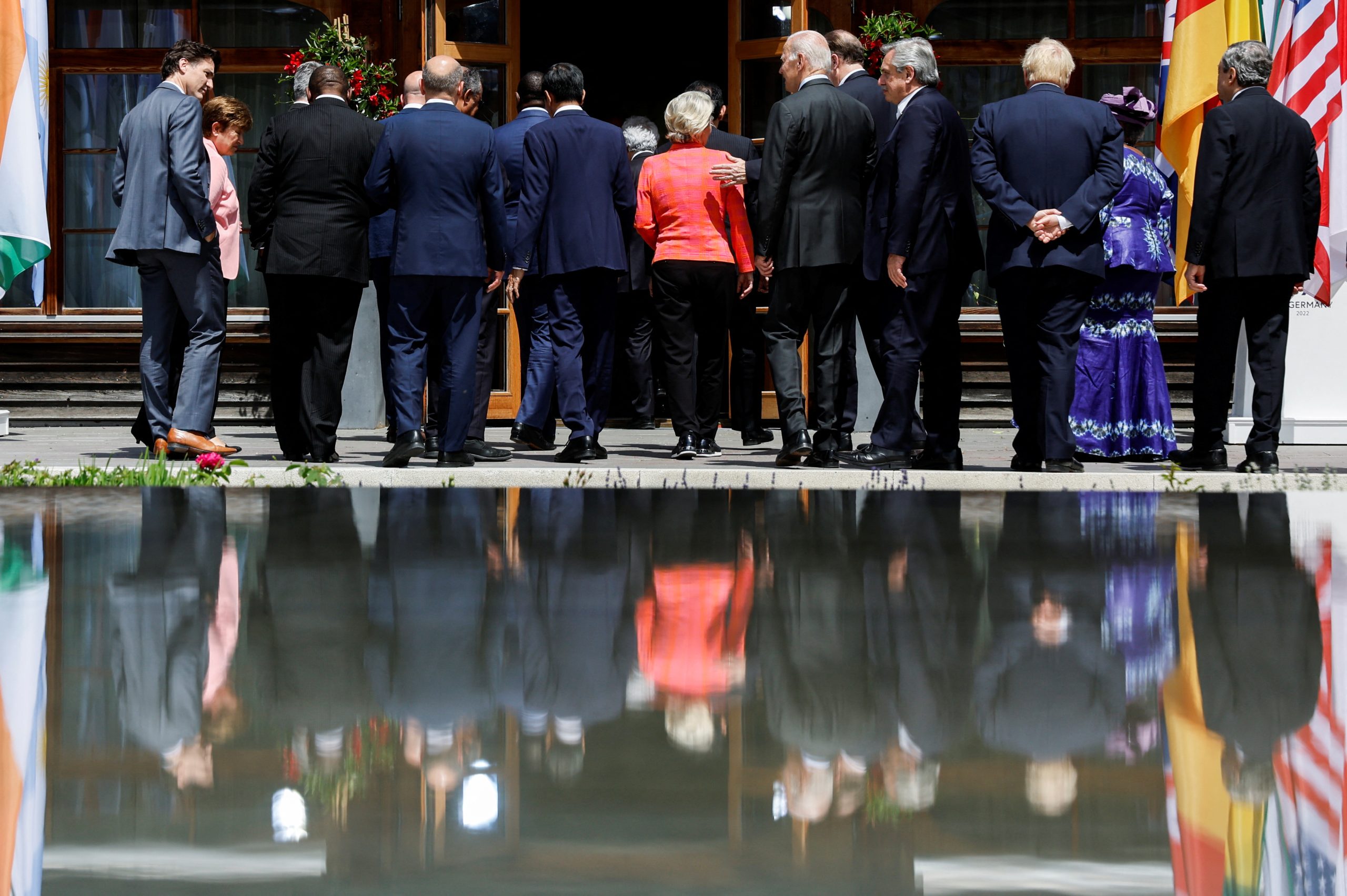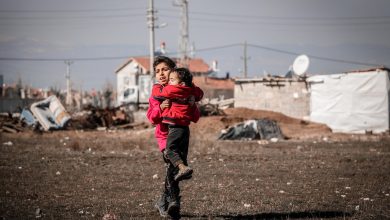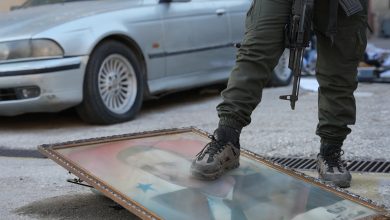Views: The Impact of Transformations in the Liberal International Order on Democracy and Human Rights in the Arab Region

Citation: Ahmed, Youssef (2022) ‘Views: The Impact of Transformations in the Liberal International Order on Democracy and Human Rights in the Arab Region’, Rowaq Arabi 27 (3), pp. 21-30, https://doi.org/10.53833/ZJFW1473
There is little doubt that the Liberal International Order (LIO) is currently under extraordinary strain. During its genesis and the decade following its establishment, some conceived the LIO as both the ark and the destination; the end of humanity’s journey towards perpetual peace and democracy.[1] The events of the past decade, however, have cast a long shadow over that unilinear outlook. The rise of populist and anti-democratic forces in the West and beyond, and the increasingly fierce challenges to the order from state actors — most recently Russia’s invasion of Ukraine, have put the order’s survival into question. The transformations in the LIO are consequential to a myriad of issues, not least those which concern the future of social and political liberalism. This article aims to address the impact of transformations in the international order on democracy and human rights in the Arab region. Turning to that necessitates first identifying what is meant by the LIO.
Recent discussions have broadly centred on two different, though undeniably bound, conceptions of the LIO. The first is the post-WWII order: the establishment of the United Nations, the Bretton Woods Institutions, and a range of international organisations and agreements that were in one form or another inspired by WWII and meant to curb future conflicts and safeguard the interests of the war’s victors.[2] The second conception of the Liberal Order is that which rests on the post-Cold War era. The collapse of the Eastern Bloc and the power vacuum that was immediately filled by the United States ultimately gave rise to the ‘Unipolar Moment,’ where the centre of world power was an unencumbered United States followed by its Western allies.[3] In this era of American hegemony, the United States was the main provider of public goods: economy, security, and allocation of prestige.[4] The post-Cold War era witnessed an acceleration of the normative and institutional proliferation of human rights on the international level,[5] as well as the rise of international humanitarianism, including the short-lived Responsibility to Protect doctrine.[6]
It is the post-Cold War conception of the LIO that is of primary concern for this article. It should be noted that the protagonists of the LIO are not homogenous actors; the United States, individual European states, and their allies in the East Asia and the Pacific have varied interests and capabilities. And within each state, there are constant frictions between different voices, trends, and institutions that ultimately produce policies. Yet considering the broad topic this article attempts to address, the term ‘West’ will be used to refer to the United States and Western Europe in contexts where their policies generally converge, specifically during major junctures such as the Arab Uprisings of 2011 or the Russian invasion of Ukraine.
The End of an Era?
To some observers, the Russian assault on Ukraine in February 2022 was a ‘punctuation mark’ to the end of the post-Cold War era; for the first time since the early 1990s the supremacy of the United States was being challenged in ‘direct great power competition.’[7] This argument has its merits, a full-scale invasion of a European sovereign state was thought to have been a thing of the past. Yet, was the assault on Ukraine the first time Russia challenged American hegemony? Or rather, was it the first time since the end of the Cold War where the West collectively stepped up to the challenge? For slightly over a decade, Russia had increasingly felt comfortable extending its reach politically and militarily. In 2008 Russia invaded Georgian territory and effectively seized control of South Ossetia and Abkhazia, and in 2014 it invaded and annexed Ukrainian Crimea. Russian inroads had even reached beyond the former Soviet realm. From backing the embattled Assad regime in Syria in 2015 to the deployment of Russian state-controlled mercenaries in Libya, Yemen, Sudan, Mali, and the Central African Republic, Russia’s military footprint was visibly expanding.[8] Western ineptitude towards Russian power-flexing inadvertently played a pivotal role in emboldening its most recent assault on Ukraine.[9] The unipolar moment arguably ended long before the war started.
Although the war in Ukraine is undeniably a significant event, it may not necessarily be the final chapter in the plight of the LIO. Admittedly, the collapse of international orders may be swift and ‘revolutionary,’ but it may also be incremental and ‘evolutionary.’ The former entails seismic events such as the breakout of a direct major war between all or most world powers or an immense financial shock that upends the system, while the latter implies slower-moving processes that ultimately lead to a transformation or breakdown of the order. Nevertheless, ‘evolutionary’ and ‘revolutionary’ changes in international systems may not necessarily be mutually exclusive.[10] In fact, the ‘revolutionary’ events that mark the ends of international orders are typically induced and preceded by smaller and slower transformations that lead to the inevitable collapse of any political order. In other words, decades from now scholars of history will look back at the Russian invasion of Ukraine as a major juncture, but whether the war will go down in history as the event that abolished the LIO is yet to be seen.
The Ukraine war would be best described as a part of a wide sequence of events and transformations that started over a decade before the war began and that may continue to unfold after the war ends. Those transformations may be too many to sum up in this space, but they can loosely be divided into internal and external transformations (to the West). The global financial crisis in 2008 and the rise of populism are examples of internal transformations and events. Externally, the dissipation of wealth and power from the centre (specifically the United States) towards other state actors, dislodged the stability of the LIO. While the consolidation of neoliberalism in the past decades and the economic imbalances that came with it are primary causes of some of the transformations in the LIO today, this article will focus on transformations that are more directly related to the Arab region.
The LIO and Erosion from Within
Internal and external transformations affect one another, and the means through which each one of those events undermined the international order varied. Yet what is of importance here is addressing the blurry line between events that contribute to the waning of the international order, and events that merely symbolise its unravelling. The rise of populism in the West is a case in point on the friction between cause and effect; how events can contribute to the collapse of the liberal order while also being a reflection of that order’s failure. President Donald Trump’s term in office came laden with attacks on the liberal order. Between his threats to pull out of NATO,[11] his unapologetic embrace of autocrats,[12] and his outright assault on democracy and human rights in the United States and globally, the threat Trump poses to the LIO cannot be overstated. Yet the election of Trump in 2016 was in itself an indicator of deeper unresolved economic, political, and identitarian contradictions in the liberal order.[13]
In many ways, the rise of Trump was a vote of no confidence in traditional political elites of the United States. The short-lived delusions of a Trump presidency being a fluke were shattered by his share of over 46 per cent of the votes in 2020 despite (or because) of his assault on the system during his term in office.[14] The diminishing power of traditional political elites is not only under threat from right-wing politicians, but also from left-wing political underdogs. The rise of Bernie Sanders in 2016 and 2020, and with him, other left-leaning political newcomers, is a testament to the limitations of traditional American elites and their ‘establishment.’ The same shifts are observed elsewhere in the West with events like Brexit or the increasing support for politicians who vehemently profess anti-EU and anti-NATO agendas. The surge in popularity of Western politicians who come from the periphery of the political systems, and who have, for an array of reasons, defined their platforms by pledges to dismantle key pillars of that system, is a reflection of a deep malaise that may ultimately upend the LIO.
Beyond the West, the rise of populist and right wing politicians in democracies such as India and Brazil contributed to the consistent global democratic backsliding for over a decade.[15] But the assumption that humanity has reached the endpoint of its ideological evolution did not prove to be incorrect solely because Western liberalism did not proliferate around the globe, but also because the institutionalisation of liberal values in the West is being uprooted.[16] The international order we live in today is fundamentally different from the order that emerged after the Cold War. If the internal strain on liberal democracy is not enough of an indicator, then the external pressure on Western hegemony leaves little room for doubt.
The Arab Region and the Unravelling of Hegemony
The American invasion of Iraq in 2003 arguably marks the apex of its hegemony in the Arab region. Not only was the ill-conceived decision to invade Iraq made despite objections from the United States’ allies in the region and the West,[17] but it also took place in violation of the rules of the liberal order the West had built.[18] Undertaking this invasion under the pretext of spreading democracy substantially undermined liberal democracy in the region and the West; the term ‘democracy promotion’ is yet to recover from its negative connotation.[19] Moreover, military adventurism in Iraq and Afghanistan ultimately fuelled isolationist tendencies in the United States.[20] By the time the Arab Uprisings unfolded in 2011, the United States might have been content to see democratic openings in the region (provided that those openings would not infringe on American interests), yet it was all but reluctant to exert resources to see those democratic breakthroughs come to fruition.
When Libyan President Moamar al-Gaddafi responded to pro-democracy protests in 2011 ferociously,[21] a UN-sanctioned NATO-led coalition established a no-fly-zone with the aim of taking ‘all necessary means’ to protect civilians. The intervention brought an end to Gaddafi’s rule in mere months, and shortly afterwards NATO’s mission was put to an end. The post-Gaddafi Libyan transitional authority had requested that NATO maintains its presence until the security situation is properly assessed,[22] yet American frustration with its history of futile attempts at state-building and weariness of getting bogged down in another ‘forever war’ in the region led to the immediate end of NATO’s presence.[23] The rest is history: the transition in Libya collapsed; warlords took over the country; Russia, different European states, and regional actors hedged their bets on the local actors that best served their perceived interests, ultimately leading to the current quagmire in Libya.[24] European disunity and the outsized role played by Russia and regional actors cannot be understood in isolation from the power vacuum left by a politically withdrawn United States.
Syria’s story is not so different, only it comes with a heftier humanitarian toll. The West’s reluctance to militarily support Syrian rebels, even through imposing a no-fly-zone, and President Barack Obama’s infamous decision to walk away from his ‘redline’ (to intervene if the Syrian regime uses chemical weapons), left a vacuum that was eventually filled by Gulf states, Turkey, Iran and not least Russian military forces.[25] The perpetuation of the Syrian conflict (which amongst other factors, was caused by the absence of the United States hegemonic role), led to unimaginable humanitarian suffering, not to mention the rise of jihadi groups.
The stories of Libya and Syria wouldn’t necessarily have had a better ending if American military adventurism in Iraq and Afghanistan was to be repeated. And it would be inaccurate to suggest that the failure of the Arab Uprisings is the responsibility of the West, considering how political elites in Syria, Libya, and many other Arab states demonstrated their sheer unpreparedness to capitalise on the events of 2011. Yet the United States’ half-hearted support of Syrian rebels and its half-baked intervention in Libya reflected a decision to deprioritise the region and cut back on the resources and political capital that it typically allocated. The United States’ timid response to the Arab Uprisings was in part fuelled by the diminishing status of its hegemony; the financial crisis of 2008 and exhaustion from previous interventions in Iraq and Afghanistan constrained its engagement post-2011. Yet, this constrained engagement set in motion a series of transformations that further undermined its hegemony and ability to influence outcomes.
On the one hand, the power vacuum left by the United States was exploited by Russia and regional actors. Any potential settlement in Syria or Libya will be shaped by the interests of Russia and regional actors such Turkey, Iran and various Gulf states, more than it will be shaped by those of the West (needless to say, the voices of ordinary Syrians and Libyans will matter the least). The diminishing influence of the West is further demonstrated by how important agreements on Syria took place through the Astana process involving Russia, Iran, and Turkey, and not through the ineffectual UN Geneva process. Moreover, the rising inclination of the United States to withdraw from the region, first displayed by Obama[26] and later proclaimed more unapologetically by Trump, induced anxieties among the United States’ Gulf allies who now started charting their courses and opened up to Russia and China, while publicly allying with Israel. On the other hand, the perpetuation of conflicts in the region exacerbated the threat posed by jihadi groups and sent waves of refugees and irregular migrants to the West, which in turn contributed to the rise of populists who undermine the liberal order from within. While the rise of right-wing movements in the West has some roots in economic conditions, the identitarian anxieties fuelled by the influx of refugees and migrants from the region had an undeniable impact.[27]
In other words, Western response to the Arab Uprisings (shaped by real or perceived constrains on its hegemony) greatly contributed to further undermining Western hegemony and the LIO to the extent witnessed today. American military adventurism in the early 2000s created constrains on its ability to shape events in the international realm, which in turn produced outcomes that further constrained its abilities internally and externally, ultimately leading to an emboldened Russia that is attempting to invade a sovereign European nation. The LIO may or may not be able to overcome its current crisis. What is clear is that regardless of such (in)ability, the current fluidity bodes ill for human rights and democracy in the Arab region. Herein lies a key question: how liberal was the LIO when it came to the Arab region?
The Illiberalism of a Liberal Order?
This question is perhaps the most elusive one this article attempts to address. Many might be tempted to cast an absolute verdict. From American invasions (Afghanistan and Iraq), to propping up authoritarian regimes (such as in Egypt or in Saudi Arabia), and enabling Israeli crimes against Palestinians, some might not find it difficult to argue that the liberal order was an illiberal force in Arab states. Yet such outlook runs the risk of being reductionist. An array of contextual variables influences the lens through which one attempts to assess the role of the LIO in the region. For instance, when we talk about the LIO, are we referring to the role of the United States, a European power, or one of the international organisations established by the West? And when we talk about the Arab region, are we talking about Iraq in 2003 (where the American invasion decimated the state), Kuwait in 1990 (where an American-led intervention saved Kuwait from the grips of the nightmarish Iraqi invasion), or mid-2000s Egypt where American pressure contributed to a democratic opening?[28]
The issue is further complicated when the lens used expands to include non-material dimensions of the hegemony of the LIO, namely the normative tendency to view liberal democracy as the most effective form of governance. The material victory of the West in the Cold War lent some credence to the notion that liberal democracy is a necessary path to fulfil the aspirations of peoples.[29] This notion, along with the international institutional set-up which included international law, treaties, and organisations, contributed to how pro-reform actors in the region articulated their visions. For instance, Mohamed al-Sayid Saeed, one of Egypt’s most renowned pro-democracy thinkers, wrote in 2006 a paper titled ‘Towards an Egyptian Conception of Democracy’ where he posited a vision that rests on the main tenets of liberal democracy, including rule of law, separation of powers, independence of institutions, and respect for human rights as they appear in the two international human rights covenants.[30] Similarly, the Damascus Declaration of 2005, a landmark document signed by Syrian political forces and pro-democracy intellectuals, called for the establishment of a democratic system in Syria that among other things, would guarantee individual and minority rights, and commits to international treaties and covenants on human rights.[31] This is not to say that Saeed, and other pro-democracy intellectuals from the region like him, sought to mimic ready-made forms of democracy, but rather that its normative power constituted a point of departure for them to begin articulating conceptions of liberal democracy that best suited their contexts.
Most of the various international human rights instruments and mechanisms, including those of the UN, are a direct extension of the liberal order. For better or worse, these platforms and mechanisms were indispensable tools utilised by pro-democracy and human rights actors from the region to articulate their demands, put pressure on their authoritarian governments, and even provide protection from persecution by authoritarian regimes.[32] In fact, one of the major threats that faces pro-democracy actors from the region today is the erosion of the ability of international mechanisms to fulfil their functions. Currently authoritarian states actively undermine the (admittedly limited) effectiveness of pre-existing international institutions by attempting to hijack them or creating parallel ones.[33]
Acknowledging whatever positive influence the LIO might have had over the region does not necessarily mean embracing the order and its patrons as selfless idealists. Hegemonic actors ultimately construct systems and enforce rules as part of their pursuit of their interests and values.[34] Nevertheless, the shift in the West’s interests and in its ability to influence outcomes in the region in the aftermath of the Arab Uprisings and again after Russia’s invasion of Ukraine may prove to be daunting to the future of democracy and human rights in the region.
Impact on Democracy and Human Rights in the Arab Region
The havoc that came at the heels of the Arab Uprisings contributed to reinforcing an ill-conceived conception of stability at the heart of Western foreign policies. Western states’ focus on short-term stability led to policies that overlook the root causes of fragility in the region, and that bet on upholding an unsustainable status quo.[35] More importantly, authoritarian rulers have become very aware of that fact and have become far less apologetic in blackmailing the West with the potential chaos they can unleash whenever they are questioned about their authoritarian governance. Gone are the days when authoritarian rulers would pay lip service to democracy; now are the days when they unapologetically proclaim that ‘Western conceptions of human rights’ do not apply to their peoples.[36]
Meanwhile, the global populist surge strengthened the hand of the Arab region’s authoritarian rulers twofold: firstly, the rise of populism in the West served as a sign that liberal democracy does not necessarily hold the solution to the aspirations of Arab peoples — the normative inclination to view liberal democracy as a solution is not as firm as it once stood.[37] Secondly, the prospects of Western leadership oscillating between populists and liberals could mean that all Arab autocrats need to do is bide their time against any liberal leadership until a more amenable populist one replaces it. There is no longer a need for autocrats to make concessions that would provide structural advantages for democratic forces in the Arab region.
The Russian invasion of Ukraine renders the prospects for democracy and human rights in the region even bleaker. Given the fluidity of the LIO, the West’s endeavour to shore up its front against Russia (and China) and reinforce its hegemonic position, will potentially lead it to the fallacious conclusion that it must acquiesce to authoritarianism in the Arab region. On the one hand, the Gulf’s energy supply could rein in economic conditions that may enable populism in the West or soften the Western public’s stance against Russia. On the other hand, winning over Arab states’ support against Russia’s challenge to the LIO would reinforce the West’s position.[38]
Yet in doing so, the West risks repeating its previous mistakes. Turning a blind eye to authoritarianism in the Arab region, and perhaps even enabling it, will unlikely make Arab regimes side with the West against Russia. What is more likely to take place is a resurgence of the dynamics of the early years of the Cold War, where Arab regimes, such as that of Nasser in Egypt during the early 1950s, stood in the middle to extract every last concession from both sides.[39] And again, the not-so-distant prospects of renewed populist leadership in the West would make going against Russia or China a short-sighted calculation on behalf of Arab rulers. Meanwhile, the ineffectual authoritarian governance prevalent across the region will inevitably reproduce the same conditions that led to the Arab Uprisings, namely repression, corruption, poverty, and ineffective governance, and will sooner or later usher in the instability the West is desperately trying to avoid.[40] The threat of instability is compounded by the looming economic and fiscal crises that were triggered by the Russian invasion — and that have their roots in the structurally flawed economic and governance models of many Arab states.
In its previous attempts to reinforce its hegemony, the West made fatal mistakes that contributed to further eroding its power. And in this current moment of fluidity, the West will likely repeat the mistakes committed post 2011, as part of a misguided attempt to revitalise the LIO. Be it as it may, the difficult mission of advocates of democracy and human rights in the Arab region has become far more complicated. Not only are pro-reform actors now facing authoritarian regimes that are far more ferocious than those of the early 2000s, but they also do so amidst an unravelling liberal order whose patrons incorrectly believe that sacrificing human rights in the region is a requisite to saving that order. Whatever assumptions pro-democracy and human rights actors were operating under two decades ago desperately need to be revisited. Though it would be hard to argue that the LIO was an inherent force of good for the prospects of democracy and human rights in the Arab region, it would be even harder to argue that conceivable alternatives to that order will not be far worse, especially if China and Russia are to play leading roles.
[1] Fukuyama, Francis (1989) ‘The End of History?’, The National Interest 16, pp.3–18.
[2] Mearsheimer, John J. (2019) ‘Bound to Fail: The Rise and Fall of the Liberal International Order’, International Security 43(4), 7–50. https://doi.org/10.1162/isec_a_00342.
[3] Krauthammer, Charles (1990) ‘The Unipolar Moment’, Foreign Affairs. accessed 26 August 2022, https://www.foreignaffairs.com/articles/1990-01-01/unipolar-moment.
[4] Ikenberry, John, and Daniel H. Nexon (2019) ‘Hegemony studies 3.0: The Dynamics of Hegemonic Orders’, Security Studies 28(3), pp. 395–421. https://doi.org/10.1080/09636412.2019.1604981
[5] Buergenthal, Thomas (1997) ‘The Normative and Institutional Evolution of International Human Rights’, Human Rights Quarterly 19 (4), pp. 703–723.
[6] Evans, Gareth (2009) ‘The Responsibility to Protect: Ending Mass Atrocity Crimes Once and for All’, Irish Studies in International Affairs 20, pp. 7–13.
[7] Walt, Stephen (2022) ‘The Ukraine War Doesn’t Change Everything’, Foreign Policy, 13 April, accessed 27 August 2022, https://foreignpolicy.com/2022/04/13/ukraine-war-realism-great-powers-unipolarity/.
[8] Fasanotti, Federica Saini (2022) ‘Russia’s Wagner Group in Africa: Influence, Commercial Concessions, Rights Violations, and Counterinsurgency Failure’, Brookings, 9 March, accessed 27 August 2022, https://www.brookings.edu/blog/order-from-chaos/2022/02/08/russias-wagner-group-in-africa-influence-commercial-concessions-rights-violations-and-counterinsurgency-failure/.
[9] A counter argument often made by realists such as John J. Mearsheimer is that liberal overreach and NATO expansion since the end of the Cold War is what provoked Russia, leading to its aggressive policy. See Mearsheimer, John J. (2014) ‘Why the Ukraine crisis is the West’s fault’, Foreign Affairs, September/October accessed 27 August 2022, https://www.foreignaffairs.com/articles/russia-fsu/2014-08-18/why-ukraine-crisis-west-s-fault.
[10] Lascurettes, Kyle M. and Michael Poznansky (2021) ‘International Order in Theory and Practice’, Oxford Research Encyclopedia of International Studies, 31 August, accessed 27 August 2022, https://doi.org/10.1093/acrefore/9780190846626.013.673.
[11] Barnes, Julian E., and Helen Cooper (2019) ‘Trump discussed pulling U.S. from NATO, Aides Say Amid New Concerns over Russia’, The New York Times, 15 January, accessed 27 August 2022, https://www.nytimes.com/2019/01/14/us/politics/nato-president-trump.html.
[12] Salama, Vivian, and Julie Pace (2017) ‘Trump has Embraced Autocratic Leaders without Hesitation’, PBS, 10 April, accessed 13 October 2022, https://www.pbs.org/newshour/world/trump-embraced-autocratic-leaders-without-hesitation.
[13] Campbell, John L. (2018) ‘Why did Donald Trump Really get Elected?’, Zarządzanie Publiczne, 4(46), pp. 5–18;
Mudde, Cas (2021) ‘Populism in Europe: An Illiberal Democratic Response to Undemocratic Liberalism (The Government and Opposition/Leonard Schapiro Lecture 2019)’ Government and Opposition 56 (4), 577-597. https://doi.org/10.1017/gov.2021.15.
[14] Cable News Network. ‘2020 Presidential Election Results’ CNN, accessed 12 October 2022, https://edition.cnn.com/election/2020/results/president.
[15] See ‘Autocratization Changing Nature? Democracy Report 2022’, Varieties of Democracy Institute (V-Dem). https://v-dem.net/media/publications/dr_2022.pdf.
[16] Fukuyama, Francis (1989) ‘The End of History?’
[17] Riedel, Bruce (2022) ‘9/11 and Iraq: The Making of a Tragedy’, Brookings, 9 March, accessed 27 August 2022, https://www.brookings.edu/blog/order-from-chaos/2021/09/17/9-11-and-iraq-the-making-of-a-tragedy/.
[18] MacAskill, Ewan and Julian Borger (2004) ‘Iraq War was Illegal and Breached UN Charter, Says Annan’, The Guardian, 16 September, accessed 9 October 2022, https://www.theguardian.com/world/2004/sep/16/iraq.iraq.
[19] Carothers, Thomas (2006) ‘The Backlash against Democracy Promotion’, Foreign Affairs 85(2), pp. 55–68. https://doi.org/10.2307/20031911.
[20] Parent, Joseph M. and Paul K. MacDonald (2011) ‘The Wisdom of Retrenchment: America Must Cut Back to Move Forward’, Foreign Affairs 90 (6), pp. 32–47.
[21] Black, Ian and Owen Bowcott (2011) ‘Libya Protests: Massacres Reported’, The Guardian, 18 February, accessed 9 October 2022, https://www.theguardian.com/world/2011/feb/18/libya-protests-massacres-reported.
[22] BBC (2011) ‘UN Security Council Votes to End Libya Operations’, BBC News, 27 October, accessed 27 August 2022, from https://www.bbc.com/news/world-africa-15481143.
[23] Goldberg, Jeffery (2016) ‘The Obama Doctrine’, The Atlantic, April, accessed 9 October 2022, https://www.theatlantic.com/magazine/archive/2016/04/the-obama-doctrine/471525/.
[24] Lahmar, Nadege (2021) ‘Unchecked Foreign Intervention: How a Lack of Commitment to Peace and Accountability Hijacked Libya’s Transition’ in Y. Ahmed (ed.), COVID-19 and Prospects of Reform in the Arab Region, (pp. 113-126). Cairo Institute for Human Rights Studies.
[25] Lund, Aron (2021) ‘Red Line Redux: How Putin Tore up Obama’s 2013 Syria Deal’, The Century Foundation, 13 July, accessed 9 October 2022, https://tcf.org/content/report/red-line-redux-putin-tore-obamas-2013-syria-deal/?agreed=1.
[26] Goldberg, Jeffery (2016) ‘The Obama Doctrine’
[27] Hamid, Shadi (2022) ‘The Role of Islam in European Populism: How Refugee Flows and Fear of Muslims Drive Right-Wing Support’, Brookings, 9 March, accessed 27 August 2022, https://www.brookings.edu/research/the-role-of-islam-in-european-populism-how-refugee-flows-and-fear-of-muslims-drive-right-wing-support/. ; On the exclusionary and identitarian nature of right-wing movements in Europe see Mudde, Cas and Cristobal Rovira Kaltwasser (2013) ‘Exclusionary vs. Inclusionary Populism: Comparing Contemporary Europe and Latin America’ Government and Opposition 48(2), 147-174. https://doi.org/10.1017/gov.2012.11.
[28] Gilley, Bruce (2013) ‘Did Bush Democratize the Middle East?’ The Effects of External-Internal Linkages’, Political Science Quarterly 128 (4), pp. 653–685.
[29] Fukuyama, F. (1989). ‘The End of History?’
[30] Saeed, Mohamed Sayed (2010) ‘Towards an Egyptian Conception of Democracy’, Rowaq Arabi 53, pp. 169-176.
[31] Carnegie Middle East Center (2012) ‘The Damascus Declaration’, Carnegie Middle East Center, 1 March, accessed 12 October 2022, https://carnegie-mec.org/diwan/48514?lang=en.
[32] Hicks, Neil (2013) ‘Transnational Human Rights Networks and Human Rights in Egypt’, in Anthony Chase and Amr Hamzawy (eds.), Human Rights in the Arab World: Independent Voices (Philadelphia: University of Pennsylvania Press). https://doi.org/10.9783/9780812208849.64
[33] Lee, Kristine (2019) ‘Coming Soon to the United Nations: Chinese Leadership and Authoritarian Values’, Foreign Affairs, 19 September, accessed 27 August 2022, https://www.foreignaffairs.com/china/coming-soon-united-nations-chinese-leadership-and-authoritarian-values.
[34] Ikenberry, John and Daniel H. Nexon, (2019) ‘Hegemony Studies 3.0’
[35] Heydemann, Steven (2022) ‘Rights as Realism in the Middle East’, Brookings, 25 July, accessed 10 October 2022, https://www.brookings.edu/blog/order-from-chaos/2022/07/25/rights-as-realism-in-the-middle-east/.
[36] Walsh, Declan (2019) ‘Egypt’s El-Sisi Welcomes European Union Leaders, But not their Scolding on Rights’, The New York Times, 25 February, accessed 10 October 2022, https://www.nytimes.com/2019/02/25/world/middleeast/sisi-egypt-european-union.html.
[37] Jamal, Amaney A. and Michael Robbins (2022) ‘Why Democracy Stalled in the Middle East’, Foreign Affairs, 13 July, accessed 11 October 2022, https://www.foreignaffairs.com/articles/middle-east/2022-02-22/why-democracy-stalled-middle-east.
[38] Biden, Joe (2022) ‘Why I’m Going to Saudi Arabia’, The Washington Post. 9July, accessed 27 August 2022, https://www.washingtonpost.com/opinions/2022/07/09/joe-biden-saudi-arabia-israel-visit/.
[39] Rubin, Barry (1982) ‘America and the Egyptian Revolution, 1950-1957’, Political Science Quarterly 97(1), pp. 73–90. https://doi.org/10.2307/2149315.
[40] Cammack, Perry, Michele Dunne, Amr Hamzawy, Marc Lynch, Marwan Muasher, Yazid Sayigh and Maha Yahya (2017) ‘Arab Fractures: Citizens, States, and Social Contracts’, Carnegie Endowment for International Peace, 1 February, accessed 12 October 2022, https://carnegieendowment.org/2017/02/01/arab-fractures-citizens-states-and-social-contracts-pub-66612.
Read this post in: العربية





